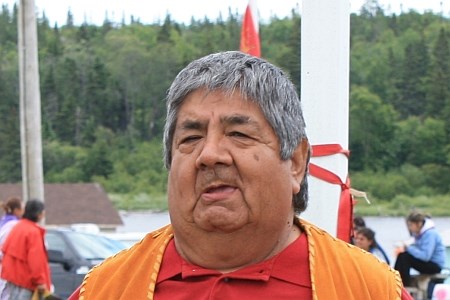The status quo just won’t do for Roy Michano.
It’s the pushing and prodding of government and big companies by the chief of the Pic River First Nation that has made the Ojibway community on the north shore of Lake Superior one of the most progressive bands in Ontario.
First elected chief in 1973, Michano has been a leading figure for the community and a source of inspiration for many others in the Robinson-Superior Treaty area for the better part of 30 years.
For most of his political life, the 67-year-old Michano has constantly used the levers of government to look for business and employment opportunities for his band members.
“I’ve got a passion for leadership and doing things.”
The community of 964 on- and off-reserve residents is just south of Marathon, and halfway between Thunder Bay and Sault Ste. Marie. The community is surrounded by natural resources in forestry, mineral wealth and hydroelectric potential. Pic River has staked an interest in all of them by using Aboriginal and non-Aboriginal partnerships.
They have agreements with the Hemlo gold complex to supply skilled labour and have signed agreements with local junior miners exploring and developing mineral prospects in their area. Pic River holds a number of forestry licenses, is a timber harvester, runs a cable television company and a fire services outfit, has high-speed Internet service, and has nearly full employment by all its members.
In the 1980s, when the Ontario government was identifying sites to develop a hydroelectric dam, Michano sat on a review committee to consider applicants to build a generation dam. Instead of looking to partner with an outside company, the band bid for the opportunity to develop the site.
“I said thanks, but no thanks, I’m not going to be joining you, I’m going to be applying for that.”
Last year, Pic River acquired full ownership of the Twin Falls hydro-electric station on the Pic River system, bringing their stable of generating stations to three with Umbata on the White River and Wawatay on the Black River for a combined capacity of 43.5 megawatts.
The generating stations have developed millions of dollars that have been invested back into the community to finance a housing development, a women’s crisis centre, a daycare centre, holistic healing centre and other social and business ventures.
With his blunt speech and take-charge attitude, Michano is an outspoken critic of companies that pollute and don’t clear up, and government promises that aren’t honoured.
He’s been aggressive on a recent series of chemical spills from the dormant pulp and paper mill into the harbour at Marathon and said he would gladly kill any development on the North Shore if it’s going to harm the environment.
“We must make sure we leave the environment within our territory clean. I can’t support anything or would be able to leave as leader only to see damage to fish and the environment. The waters must be kept clean.”
The community has signed a memorandum of understanding with Marathon PGM Corporation in the hopes that job and business opportunities can result from the creation of the open-pit base metal mine.
His newest cause is going after mining companies for revenue sharing. Growing up in the North Shore community, Michano said mining companies never saw consultation as a part of the process, and it took a series of Supreme Court of Canada decisions over several years to force government to consult and accommodate when exploration was occurring on their traditional lands.
But Michano said First Nations are still caught between the dynamics of federal and provincial legislation that is “corrupting our capacity to take advantage of revenue sharing.”
He wants to see something in Ontario’s Mining Act that delivers revenue sharing for First Nations.
“Where’s our share? The municipalities are excited by the extended life ofthe mines because they’ll get their million-dollar tax concessions.”
Michano looks back with some bitterness that his First Nation never realized any real benefits when the Hemlo gold complex started production in the mid-1980s. But the community does have an employment contract with Barrick Gold with the Williams Mine and members of the band work there.
Mining companies must have a clear concept of a “win-win situation.”
“Open dialogue, trust and respect are the fundamental principles of proper negotiations.”
As Ontario reviews its forest land tenure system, there are new opportunities ahead for Pic River.
Through an arrangement with the towns of Marathon and Manitouwadge, Pic River is vying to secure local tenure as a sustainable forest licence holder for the Big Pic Forest, a big chunk of which was once used by the closed Marathon Pulp operation.
“We are going to be orchestrating control of local fibre that should (have) proper management, no more clearcuts and undercutting of small timber and leaving piles of brush that can be used for value-added concepts.
“The big boys don’t want us to be in control management of the timber sitting around us.”
On the greenfield energy front, Pic River is involved with wind energy projects in negotiating with players like Brookfield Power to develop wind farms along the shore of Lake Superior. They are also working with other communities to help build a transmission corridor between Nipigon and Wawa.




